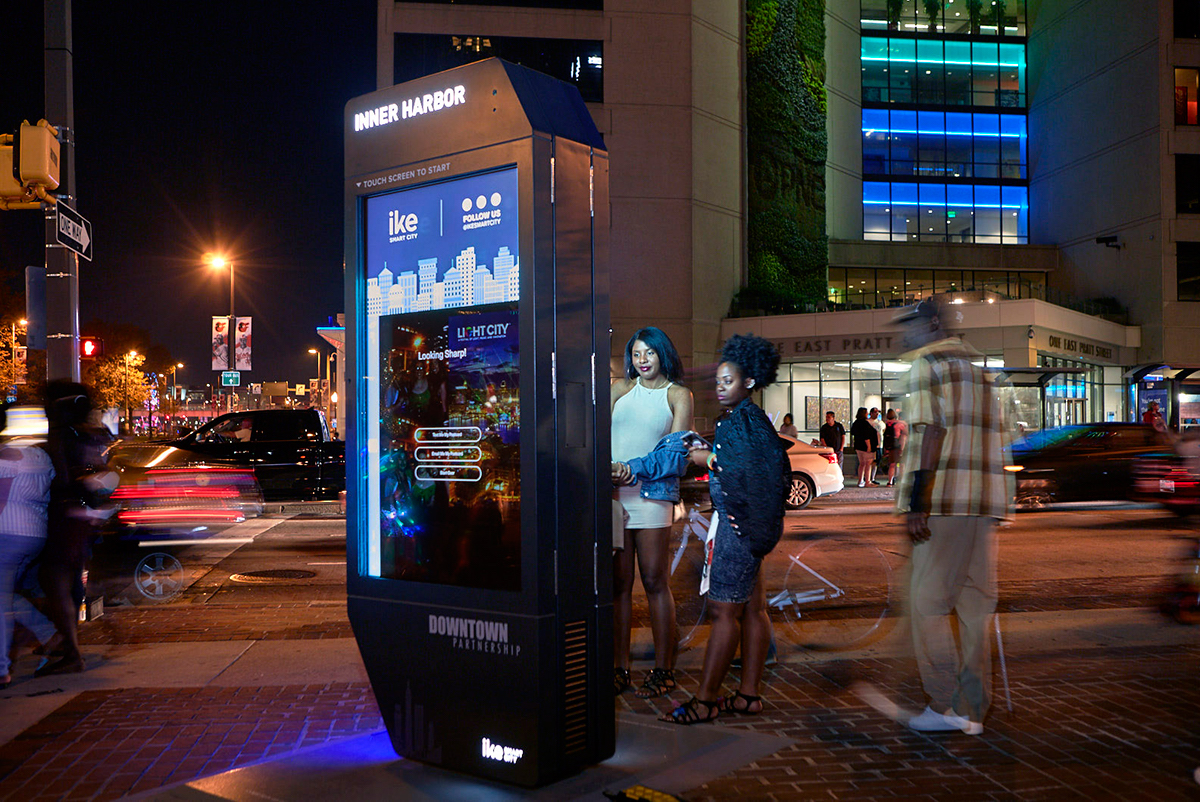The way Oakland allows companies to advertise on city sidewalks could soon change. Historically, Clear Channel Outdoor has had a deal to advertise on bus shelters and use part of the revenue to maintain the structures.
But the City Council is now looking at expanding its “street furniture program” by placing 8-foot tall touchscreen kiosks in its business districts. The touchscreen kiosks under consideration can direct people to neighborhood restaurants and shops and services like homeless shelters.
They provide free wifi and could include surveillance cameras. The bright interactive screens would be a major change to the city’s right-of-way, adding to bus shelters, bicycle racks, and e-scooter and e-bikes. Supporters say they would bring in additional revenue and be a boon for local businesses.
Convenient information tools, but some privacy concerns
IKE Smart City, the company that makes the kiosks, is proposing to put as many as 50 of them in Oakland. Their technology can be found locally in Berkeley, which became the first California city to use IKE’s technology in December. Berkeley’s first round of kiosks were placed in downtown, Telegraph Avenue, and the Lorin Business District in South Berkeley.
An IKE Smart City representative told the council on Tuesday the kiosks look like an “8-foot-tall iPhone that sticks in city sidewalks.”
When in “passive mode,” the screens flip through advertisements, but when touched it can help people navigate a neighborhood in multiple languages and find local attractions, services, and businesses.
Clay Collett, senior development director with IKE, said the kiosks also have what he called “emergency options,” including cameras, a 911 call system, and displays of Amber Alerts and earthquake information. Collett told council IKE is offering to give the city one of every eight advertising slides, $250,000 upfront to pay for staff time, and revenue sharing that could bring about $1 million a year.
Some members of council who like the kiosks said they are opposed to the security camera option and other features that would scoop up data from people’s cell phones. Councilmember Sheng Thao said Oakland should follow in the footsteps of Berkeley in not allowing the technology to capture IP addresses or include security cameras. That could be a consideration down the road but would first have to be vetted by the city’s Privacy Advisory Commission.
City Administrator Ed Reiskin and Department of Transportation officials cautioned council from moving too fast. They want more time to vet the revenue sharing offer to make certain the program is sustainable and will compliment existing street furniture.
Maintaining the city’s approximately 250 bus shelters, officials said, has been a challenge. For the past 20 years, the city has allowed Clear Channel Outdoor to advertise on the structures. Clear Channel helps pay for installing and repairing the shelters and the council at Tuesday’s meeting extended an agreement with the company for another year, with an option to extend for a second year.
While separate from the bus shelter program, the introduction of new advertising displays on city streets would bring competition to CCO, who has had non-exclusive bus shelter advertising contract.
Transportation Department Director Ryan Russo said “we are passionate about providing amenities in the right of way” but “our main desire is to not have a shiny, beautiful thing in the right of way while other things are in disrepair without a long-term strategy.”
A contract agreement with IKE Smart City could return to council later this year. The City Council on Tuesday directed the City Administrator’s Office to begin negotiation with IKE to set parameters on privacy concerns, where the kiosks would be placed, and how they would be maintained.

